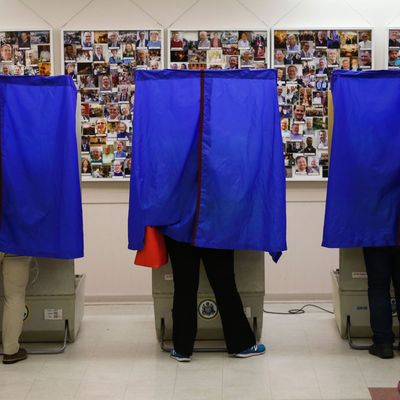
The post-Brexit political crisis in the U.K. should be an eye-opener for American partisans, particularly those Bernie Sanders supporters who think it’s a travesty to limit voting in presidential primaries to members of the Democratic Party, or to give elected officials a formal role in the nomination process.
In the U.K., the party leaders (i.e., those who will compete to be prime minister in national elections) are chosen by dues-paying party members. The Tories charge 25 pounds a year — with lower rates for youth and military — and Labour has a standard monthly dues rate of 3.92 pounds, though the party recently created a cheaper “registered supporter” option at 3 pounds a year that carries with it the right to vote in leadership elections. The system also includes the equivalent of the U.S. Democratic Party’s “superdelegates.” Members of Parliament (the House of Commons, and in the Labour Party also Members of the European Parliament) determine the field for leadership contests by a nomination process; Tory MPs have the responsibility to narrow the field to two candidates before members get involved. In both parties, MPs can trigger a leadership contest by a vote of “no confidence” in the leader and then the nomination of one or more challengers. That’s the process currently in motion in the Labour Party, where Jeremy Corbyn will soon face a challenge and a new leadership election even though he has only been leader since September of last year.
While the left in the United States tends to oppose closed primaries at present, and the right tends to favor them, both left and right in the U.K. have their base in the dues-paying party membership. Indeed, the socialist Jeremy Corbyn won his leadership election — in an upset, yet by a landslide — on the basis of a big surge in party membership (and/or “registered supporter” membership), and it remains possible that he will hang on to his position in a second election despite the extraordinary and bitter opposition to him among Labour MPs and signs that his leadership and issue positions are not that popular with Labour voters or the new voters the party needs.
If the British system for nominating leaders seems, well, anti-democratic, it used to be far more restricted. Before 1998, Tory MPs completely controlled their party’s leadership contests. And before Gordon Brown proposed a new “one member, one vote” system for Labour in 2010, that party used an “electoral college” in which MPs had one vote, party affiliates (mostly unions) had one vote, and then party members had the final vote.
The more grassroots-y process now in use in the U.K. still gives short shrift to loyal voters who may not be well represented by either dues-paying party members or by MPs. All they can do is vote or not vote for the party as led or misled, and hope things get better. Such people really do have a bigger role in the U.S. system.






























